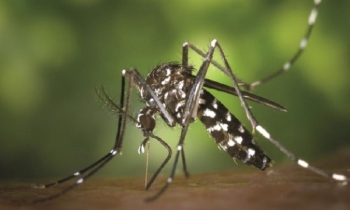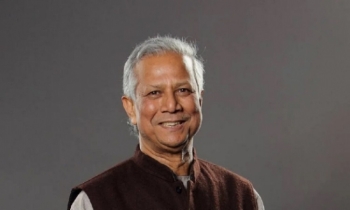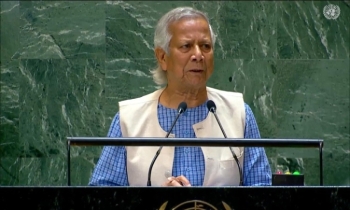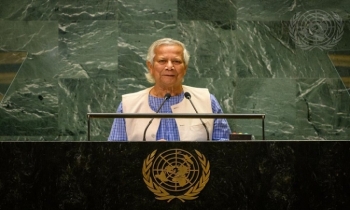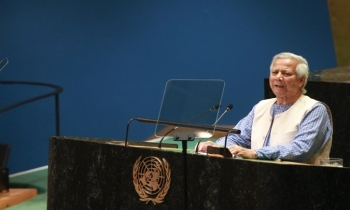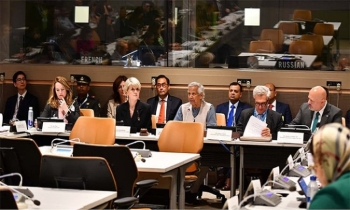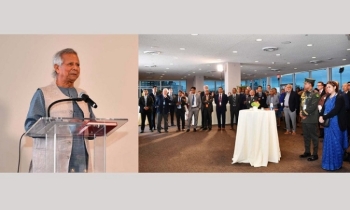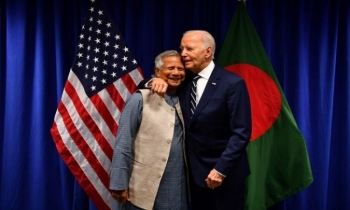Nation set to pay homage to language martyrs Tuesday
BI Report || BusinessInsider
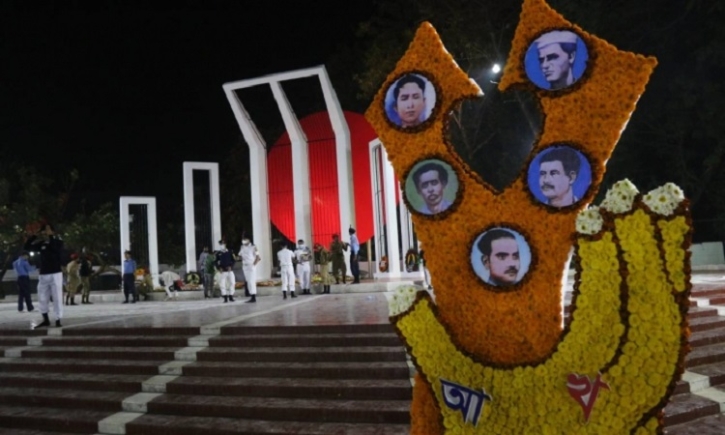
File photo
The nation is all set to observe the Shaheed Dibash (Martyrs Day) and the International Mother Language Day on Tuesday with due respect. The day is a public holiday.
People from all walks of life will pay glowing tributes to the memories of the language movement martyrs, the valiant sons of the soil who made supreme sacrifice to establish the rights of the mother tongue, Bangla, in 1952.
The day will be observed around the world as the UNESCO recognised the 'February 21 (Ekushey February)' as the International Mother Language Day on November 17, 1999.
The government has already taken various programmes to observe the day in a befitting manner.
President M Abdul Hamid and Prime Minister Sheikh Hasina will lead the nation to pay respect to language martyrs by placing wreaths at the Central Shaheed Minar beside Dhaka Medical College and Hospital at one minute past zero hour.
Both the president and the premier will issue separate messages paying rich tributes to those who embraced martyrdom on the day.
In observance of the day, the Central Shaheed Minar premises is being decorated with paintings, graffiti, buntings and selected verses on the mother language.
Tight security measures have been enforced around the main altar of the Shaheed Minar, its adjoining areas and Azimpur graveyard of the language martyrs.
Different political-social-cultural-professional organizations, including the ruling Awami League, have taken various programmes such as seminars and cultural functions, to observe the Amar (immortal) Ekushey in a befitting manner.
The Cultural Affairs Ministry has drawn up an elaborate programme to observe the day at national level.
The programme was finalized following an inter-ministerial meeting recently with State Minister for Cultural Affairs KM Khalid in the chair.
The national flags will be kept half-mast in a proper manner having accurate size at all the buildings of government, semi-government, autonomous and private organisations and educational institutions.
In line with the national programmes, all educational institutions, local government bodies, district and upazila administrations, Bangladesh missions abroad will take proper measures to observe the day.
Fateha and Qurankhwani will be offered at Azimpur graveyard and special prayers will be arranged at all worship places across the country seeking eternal peace of the language martyrs.
Proper measures will be taken to strengthen the security system in and around all the venues, including the Central Shaheed Minar, and Dhaka University campus adjoining areas.
On the occasion, road islands and other important places in the capital will be decorated with festoons inscribed with letters of different languages including Bangla.
Public and private mass media will take necessary measures to carry out awareness programmes on pronouncing names of language martyrs properly, protecting significance of the Shaheed Dibash, upholding the dignity of Shaheed Minar and placing wreaths at Shaheed Minar in a disciplined manner.
The newspapers will publish special supplements on this occasion.
Bangladesh missions abroad will organise different programmes, including placing wreaths at Shaheed Minar, discussions on Bangabandhu and Language Movement, and book and photo exhibitions where diplomats of different countries and Bangladeshi expatriates will join.
Besides, messages of the president, the prime minister, foreign minister, state minister for foreign affairs and state minister for cultural affairs also will be read out at the missions.
Mass Communication Department will stage mobile musical function on streets through trucks and on waterways in Dhaka city's surrounding areas through water vessels and films and documentaries will be screened at district and upazila levels.
The Department of Films and Publications will publish three types of posters, marking the Amar Ekushey.
Children, students, senior citizens and the children with special needs could visit the National Museum and its affiliated branch museums and all the archeological sites and museums under the Department of Archaeology free of cost.
On February 21 in 1952, Salam, Rafique, Shafique, Jabbar and Barkat embraced martyrdom in police firing in front of the Dhaka Medical College and Hospital (DMCH) as they took to the street to intensify the campaign to establish Bangla as the state language of the then Pakistan, sowing the seeds of subsequent movements for the country's independence.
They were killed as police opened fire on students demonstrating under the All-Party Students Action Committee against conspiracies of Pakistani rulers to declare "Urdu" as the only state language.
The movement for Bangla, however, did not stop and Pakistan government on February 29, 1956 was compelled to recognise Bangla as one of the state languages besides Urdu.
The decision, however, could not stop the movement against repression and misrule of Pakistani government that subsequently led the Bangalee to the War of Independence and the emergence of Bangladesh.

